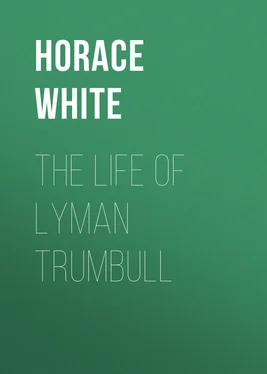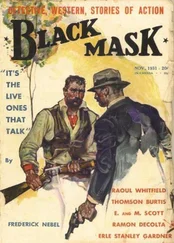Horace White - The Life of Lyman Trumbull
Здесь есть возможность читать онлайн «Horace White - The Life of Lyman Trumbull» — ознакомительный отрывок электронной книги совершенно бесплатно, а после прочтения отрывка купить полную версию. В некоторых случаях можно слушать аудио, скачать через торрент в формате fb2 и присутствует краткое содержание. Жанр: foreign_prose, История, foreign_edu, foreign_antique, на английском языке. Описание произведения, (предисловие) а так же отзывы посетителей доступны на портале библиотеки ЛибКат.
- Название:The Life of Lyman Trumbull
- Автор:
- Жанр:
- Год:неизвестен
- ISBN:нет данных
- Рейтинг книги:5 / 5. Голосов: 1
-
Избранное:Добавить в избранное
- Отзывы:
-
Ваша оценка:
- 100
- 1
- 2
- 3
- 4
- 5
The Life of Lyman Trumbull: краткое содержание, описание и аннотация
Предлагаем к чтению аннотацию, описание, краткое содержание или предисловие (зависит от того, что написал сам автор книги «The Life of Lyman Trumbull»). Если вы не нашли необходимую информацию о книге — напишите в комментариях, мы постараемся отыскать её.
The Life of Lyman Trumbull — читать онлайн ознакомительный отрывок
Ниже представлен текст книги, разбитый по страницам. Система сохранения места последней прочитанной страницы, позволяет с удобством читать онлайн бесплатно книгу «The Life of Lyman Trumbull», без необходимости каждый раз заново искать на чём Вы остановились. Поставьте закладку, и сможете в любой момент перейти на страницу, на которой закончили чтение.
Интервал:
Закладка:
I hope this investigation will be thorough and complete. I believe it will do good by disabusing the public mind, in that portion of the Union which feels most sensitive upon this subject, of the idea that the outbreak at Harper's Ferry received any countenance or support from any considerable number of persons in any portion of this Union. No man who is not prepared to subvert the Constitution, destroy the Government, and resolve society into its original elements, can justify such an act. No matter what evils, either real or imaginary, may exist in the body politic, if each individual, or every set of twenty individuals, out of more than twenty millions of people, is to be permitted, in his own way and in defiance of the laws of the land, to undertake to correct those evils, there is not a government on the face of the earth that could last a day. And it seems to me, sir, that those persons who reason only from abstract principles and believe themselves justifiable on all occasions, and in every form, in combating evil wherever it exists, forget that the right which they claim for themselves exists equally in every other person. All governments, the best which have been devised, encroach necessarily more or less on the individual rights of man and to that extent may be regarded as evils. Shall we, therefore, destroy Government, dissolve society, destroy regulated and constitutional liberty, and inaugurate in its stead anarchy—a condition of things in which every man shall be permitted to follow the instincts of his own passions, or prejudices, or feelings, and where there will be no protection to the physically weak against the encroachments of the strong? Till we are prepared to inaugurate such a state as this, no man can justify the deeds done at Harper's Ferry. In regard to the misguided man who led the insurgents on that occasion, I have no remarks to make. He has already expiated upon the gallows the crime which he committed against the laws of his country; and to answer for his errors, or his virtues, whatever they may have been, he has gone fearlessly and willingly before that Judge who cannot err; there let him rest.
The debate continued several days and took a pretty wide range, the leading Senators on both sides taking part in it. Trumbull bore the brunt of it on the Republican side, and was cross-examined in courteous but searching terms by Yulee, of Florida, Chesnut, of South Carolina, and Clay, of Alabama, who conceived that the teachings of the Republican party tended to produce such characters as John Brown. Trumbull answered all their queries promptly, fully, and satisfactorily to his political friends, if not to his questioners. Nothing in his senatorial career brought him more cordial letters of approval than this debate. One such came from Lincoln:
Конец ознакомительного фрагмента.
Текст предоставлен ООО «ЛитРес».
Прочитайте эту книгу целиком, купив полную легальную версию на ЛитРес.
Безопасно оплатить книгу можно банковской картой Visa, MasterCard, Maestro, со счета мобильного телефона, с платежного терминала, в салоне МТС или Связной, через PayPal, WebMoney, Яндекс.Деньги, QIWI Кошелек, бонусными картами или другим удобным Вам способом.
1
Mr. H. C. Lodge, in his Life of Daniel Webster , says, touching the debate with Hayne in 1830:
"When the Constitution was adopted by the votes of states at Philadelphia, and accepted by the votes of states in popular conventions, it is safe to say that there was not a man in the country, from Washington and Hamilton, on the one side, to George Clinton and George Mason, on the other, who regarded the new system as anything but an experiment entered upon by the states, and from which each and every state had the right to peaceably withdraw, a right which was very likely to be exercised."
Mr. Gaillard Hunt, author of the Life of James Madison , and editor of his writings, has published recently a confidential memorandum dated May 11, 1794, written by John Taylor of Caroline for Mr. Madison's information, giving an account of a long and solemn interview between himself and Rufus King and Oliver Ellsworth, in which the two latter affirmed that, by reason of differences of opinion between the East and the South, as to the scope and functions of government, the Union could not last long. Therefore they considered it best to have a dissolution at once, by mutual consent, rather than by a less desirable mode. Taylor, on the other hand, thought that the Union should be supported if possible, but if not possible he agreed that an amicable separation was preferable. Madison wrote at the bottom of this paper the words: "The language of K and E probably in terrorem ," and laid it away so carefully that it never saw the light until the year 1905.
2
Letters of Daniel Webster , edited by C. W. Van Tyne, p. 67. Mr. Van Tyne says that Webster "here advocated a doctrine hardly distinguishable from nullification."
3
Referring to this speech of Calhoun and to Webster's reply, Mr. Lodge says:
"Whatever the people of the United States understood the Constitution to mean in 1789, there can be no question that a majority in 1833 regarded it as a fundamental law and not a compact,—an opinion which has now become universal. But it was quite another thing to argue that what the Constitution had come to mean was what it meant when it was adopted."
See also Pendleton's Life of Alexander H. Stephens , chap. XI.
4
G. H. Moore's History of Slavery in Massachusetts , p. 215.
5
Jefferson was cut to the heart by this failure. Commenting on an article entitled "États Unis" in the Encylopédie , written by M. de Meusnier, referring to his proposed anti-slavery ordinance, he said:
"The voice of a single individual of the State which was divided, or one of those which were of the negative, would have prevented this abominable crime from spreading itself over the new country. Thus we see the fate of millions unborn hanging on the tongue of one man, and Heaven was silent in that awful moment."
6
General W. T. Sherman as College President , p. 88.
7
Stuart's Life of Jonathan Trumbull says that the family name was spelled "Trumble" until 1766, when the second syllable was changed to "bull."
8
Joseph, the second son of the John above mentioned, who had settled in Suffield, Connecticut, in 1670, removed to Lebanon. He was the father of Jonathan Trumbull (1710-1785), who was governor of Connecticut during the Revolutionary War, and who was the original "Brother Jonathan," to whom General Washington gave that endearing title, which afterwards came to personify the United States as "John Bull" personifies England. (Stuart's Jonathan Trumbull , p. 697.) His son Jonathan (1740-1809) was a Representative in Congress, Speaker of the House, Senator of the United States, and Governor of Connecticut. John Trumbull (1756-1843), another son of "Brother Jonathan," was a distinguished painter of historical scenes and of portraits.
9
Reynolds wrote a Pioneer History of Illinois from 1637 to 1818 , and also a larger volume entitled My Own Times . The latter is the more important of the two. Although crabbed in style, it is an admirable compendium of the social, political, and personal affairs of Illinois from 1800 to 1850. Taking events at random, in short chapters, without connection, circumlocution, or ornament, he says the first thing that comes into his mind in the fewest possible words, makes mistakes of syntax, but never goes back to correct anything, puts down small things and great, tells about murders and lynchings, about footraces in which he took part, and a hundred other things that are usually omitted in histories, but which throw light on man in the social state, all interspersed with sound and shrewd judgments on public men and events.
Читать дальшеИнтервал:
Закладка:
Похожие книги на «The Life of Lyman Trumbull»
Представляем Вашему вниманию похожие книги на «The Life of Lyman Trumbull» списком для выбора. Мы отобрали схожую по названию и смыслу литературу в надежде предоставить читателям больше вариантов отыскать новые, интересные, ещё непрочитанные произведения.
Обсуждение, отзывы о книге «The Life of Lyman Trumbull» и просто собственные мнения читателей. Оставьте ваши комментарии, напишите, что Вы думаете о произведении, его смысле или главных героях. Укажите что конкретно понравилось, а что нет, и почему Вы так считаете.












